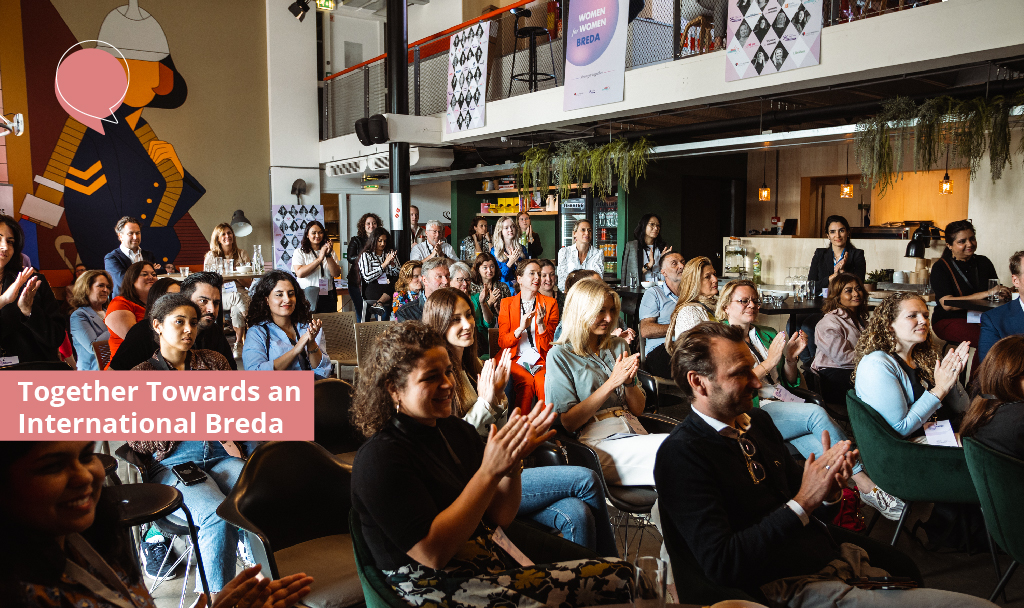
July 2023 | Written by – Ariel Slaughter
The Women for Women Breda Closing Finale was all about celebrating an international Breda and West Brabant region. A spotlight shown on the amazing talent that’s locally available, the need for these talents in the tight labour market, and the benefits and ways forward to achieve regional internationalisation to help internationals better integrate socially and professionally into Dutch society.
About Women for Women Breda
This first edition of Women for Women Breda (WfW Breda) was a pilot featuring 10 Talents from Breda and the West Brabant region based on the successful Eindhoven initiative. WfW Breda is a collaboration between the Expat Spouses Initiative (ESI), Breda Internationals, and the Living In program of Holland Expat Center South.
Regardless of the city, the goal of the program is to connect local female international talent, who are highly educated and skilled with local female mentors or Ambassadors. During a three-month program, the Talents, as they are called, receive career workshops from expert coaches to help them understand the demands of the local labour market and how their skills meet those demands. Their Ambassadors offer personalised advice and insights that help bring them closer to employment in the Netherlands.
Internationalising Breda
The event began, as all great events should, with mingling and networking over drinks before an introduction from Carmen Rasmussen, the Breda and West Brabant Living In coordinator of the Holland Expat Center South, and Kavitha Varathan, founder and CEO of the Expat Spouses Initiative. Their key message highlighted the opportunity that international talent offers the region if SMEs, educational organizations, and the government accelerate towards internationalisation and how they are working to achieve that. There also was a special recorded message from Carla Kranenborg-van Eerd, Alderman for Economy, Labour Market, and Finance for the Gemeente Breda, who was unable to attend the event but still wanted to show her support.
To drive home the importance of making use of every talent here in the region, Milou Audenaerd, Labour Market Advisor at UWV West-Brabant outlined the status of the West-Brabant labour market.
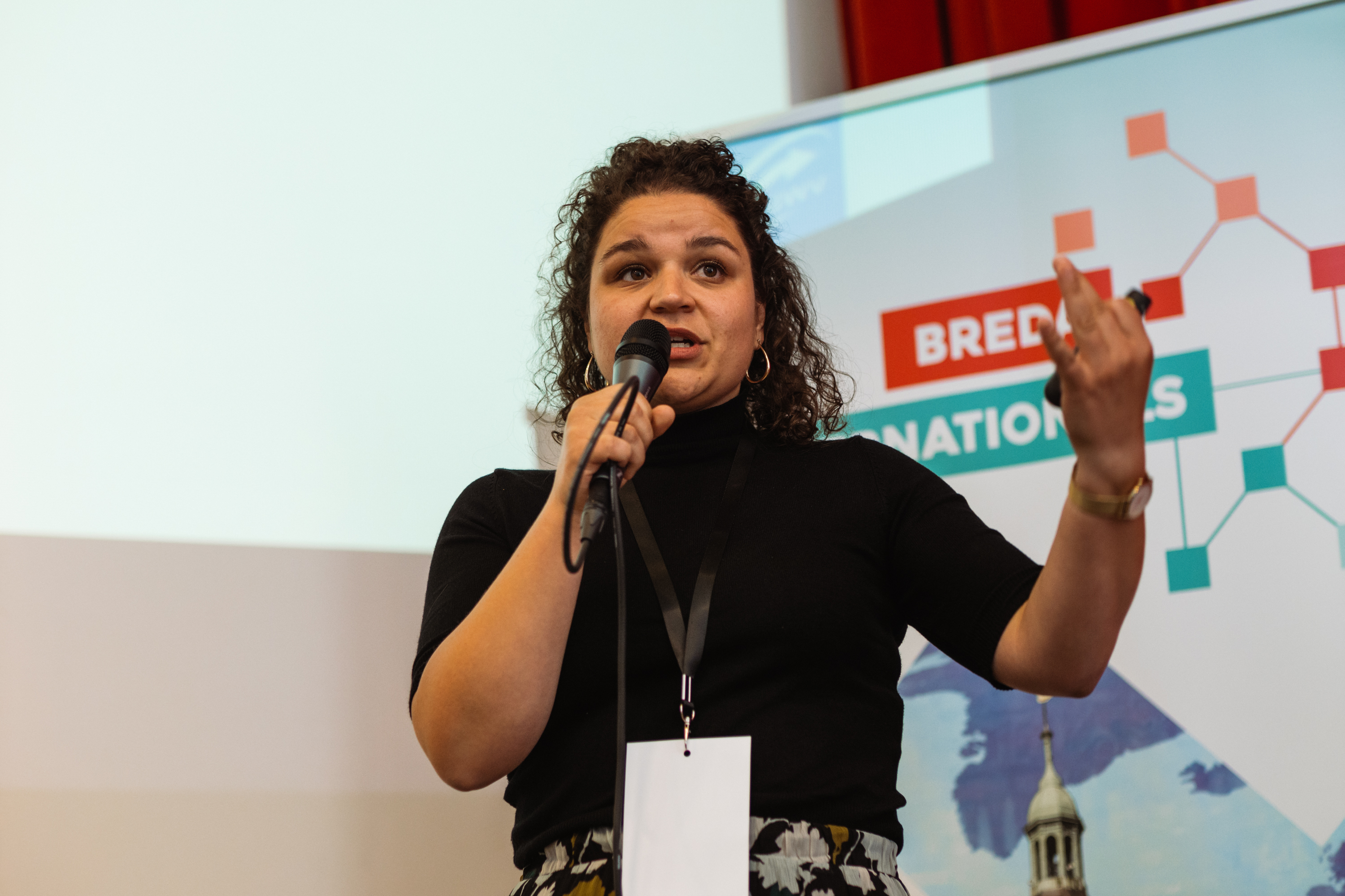
The West-Brabant Labour Market by the Numbers
Despite stabilizing during the pandemic, the Dutch labour market quickly returned to being tight in 2021 and reached very tight status in Q4 2022. Milou said, that “for some regions, if there was a very, very tight labour market [classification], that would be the case.” In fact, there are five jobs for every job seeker in the Netherlands right now.
CBS (Centraal Bureau voor de Statistiek) forecast that the Netherlands will grow this year and the next, but it will be less than in previous years. What does that mean for the labour market? In West Brabant, the number of jobs will continue to increase in 2023 but will come to a halt in 2024. There are two reasons for this: one is the lower projected economic growth and the other is that staff shortages will have a direct impact on growth. Companies simply cannot grow without staff. This is the first time that labour market shortages have determined economic growth.
Even with forecasted lower economic growth in 2024, the tight labour market will continue. The number of employees who will retire in the upcoming years and the ageing population versus the number of younger employees to replace them and high number of part-time employees in the Netherlands are all factors that will put increased pressure on the labour market tightness.
The challenges of a tight labour market are many but there are solutions! When surveyed 3,000 employers about how they fulfil vacancies, 87% simply extend the reaction time of their job advertisements; 69% will use other recruitment channels, such as recruitment agencies; while only 46% will reduce a job’s requirements. Of those solutions perhaps the most promising is the reduction of job requirements. In this way, employers can find the staff they need to grow, and when paired with on-the-job training, boost their employees’ skills and qualifications to meet their original jobs requirements over time. In short, companies need to be more flexible to see all job seekers for their potential rather than rigidly stick to a list of qualifications.
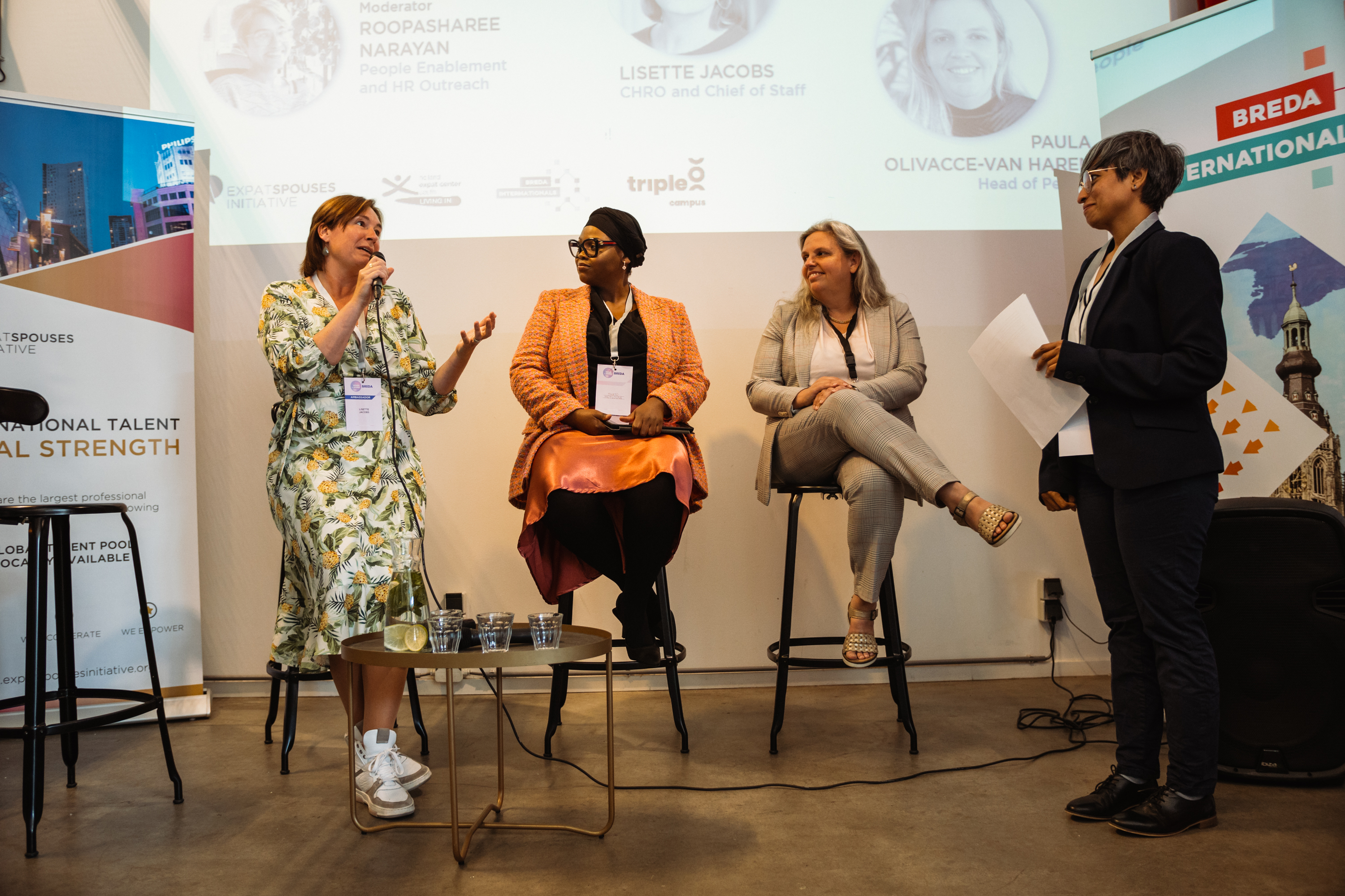
Panel Discussion
The Key to Unlock Untapped Talent
The next panel gave insights into what some companies are doing and can do to reach different talent pools, like those of accompanying partners or international students. The panel included Lisette Jacobs, chief human resources officer and chief of staff at Lamb Weston; Paula Olivacce-van Haren, head of people at Ericsson, and Thato Motloung, researcher of smart cities and logistics at the Breda University of Applied Sciences. The panel discussion was moderated by Roopasharee Narayan, a team member of the Expat Spouses Initiative responsible for people engagement and human resources outreach.
To deal with the skills shortage, at Lamb Weston Lisette said that the pandemic helped push them out of their “fairly traditional” recruitment mindset. “We were always really focused on if we hire somebody you need to have all those skills, but slowly we are reverting into ‘No, we’re hiring somebody who fits with our culture of our company, and we’re hiring someone who wants a career with us.’ The rest we can teach you.”
Paula responded from Ericsson’s point of view:
“If you look at the diversity and inclusion in our organisation when I joined nine years ago, it was already there, especially [for] nationalities. However, if you look at age diversity, that is the real challenge, and is still a challenge because young people come and go.”
When it comes to using new and creative ways to reach different talent pools, Thato recommends that companies “go to where they are”. She continued, “If you keep on fishing in the same pond, you are probably going to find the same type of fish. What is the first place that underrepresented communities go to, that is where you can start sourcing them, from their communities.” At Ericsson, they are targeting diversity in a few ways, such as telling their recruiters to hire from diverse groups and using targets to keep them accountable. “If we don’t set the targets, it’ harder to get that change in the mindset,” Paula said.
Mindset is important. Only a directed and conscious effort can change happen. When asked what government, businesses and communities can do to make the Netherlands a more equitable society for people from all walks of life, the panellists offered:
Thato:
“We’ve heard from Carmen, that it does help to speak Dutch, but from the government’s side It might also help to lower that as an entry barrier, because that is a big entry barrier for internationals. If you come into the country, you risk becoming deskilled in the process of learning a language. It doesn’t take one month, and it doesn’t take two months to get to a professional level of Dutch. So, we need to find a compromise.”
Lisette:
“[Government needs to invest in infrastructure such as housing, childcare, and transportation.] If you look at local levels, investment in programs like this helps. I think it would be a waste if after the first year [Women for Women Breda] wouldn’t continue…If you look at the employee side, it’s important to create a work environment where people feel welcome.”
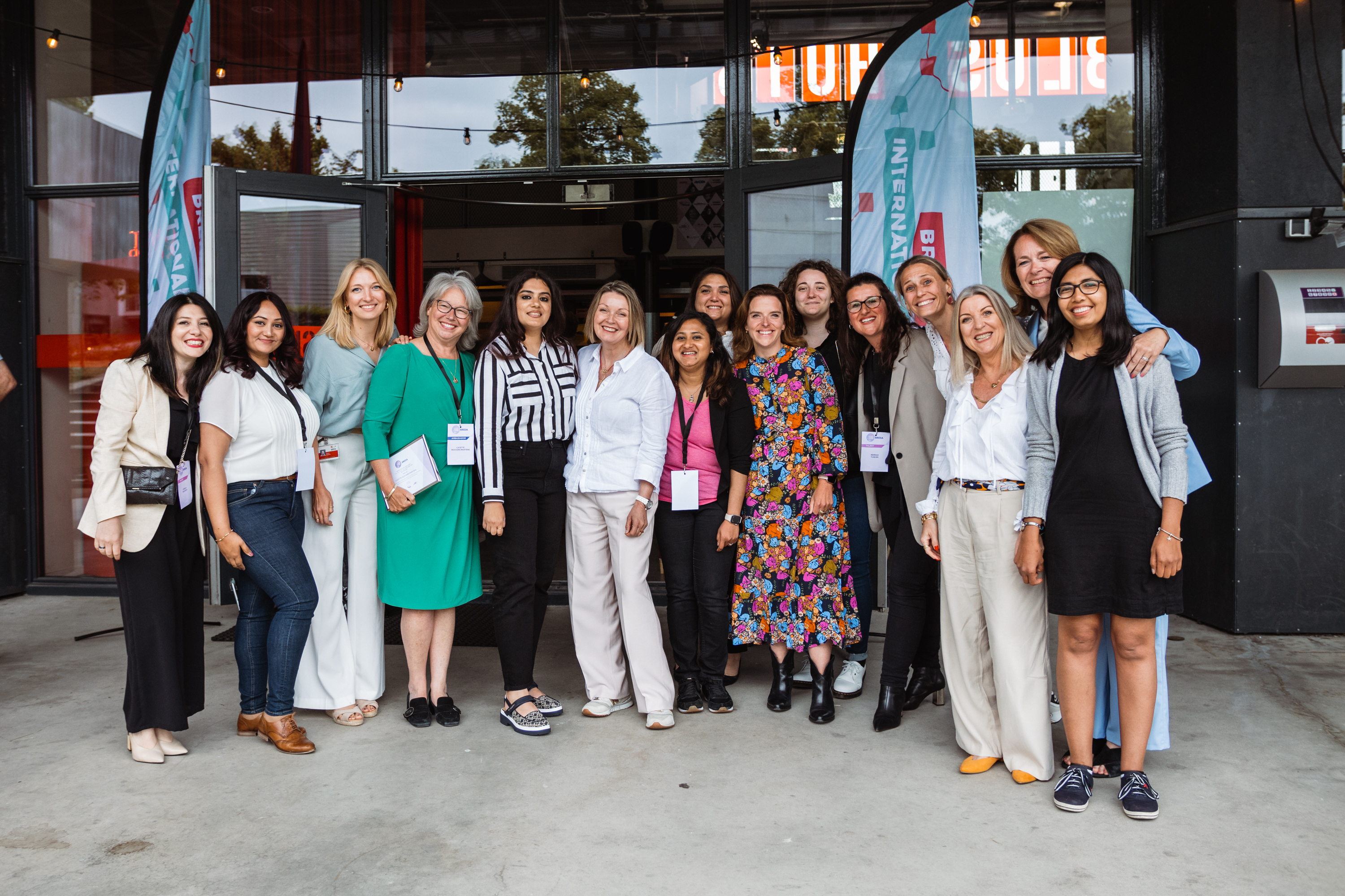
Talents On Stage
The ten Talents from Women for Women Breda were the next group to take the stage, led by their fellow Talent, Berran Tuncer. After telling her story, Berran enthusiastically introduced each Talent to the audience and briefly shared their stories and professional journey and aspirations before asking everyone to scan the QR code to connect with them via LinkedIn.
The Talents were:
- Sukanya Vashishtha, Biotech Engineer
- Vusula Guliyeva, International Relations & Project Coordinator
- Chitra Vignesh, Corporate Consultant
- Simonetta Cota, User Experience Designer
- Sabita Van Delft-Amin, International and European Legal Project Coordinator
- Janet Vigueras, Lawyer
- Ezgi Boyer Ipek, Mechanical Design Engineer
- Cristina Otte, Marketing, Sales & Strategy
- Berran Tuncer, DEI (Diversity, Equity and Inclusion) Agent and English Teacher
- Rachana Thosar, Back Office Support for Financial Services & Administration
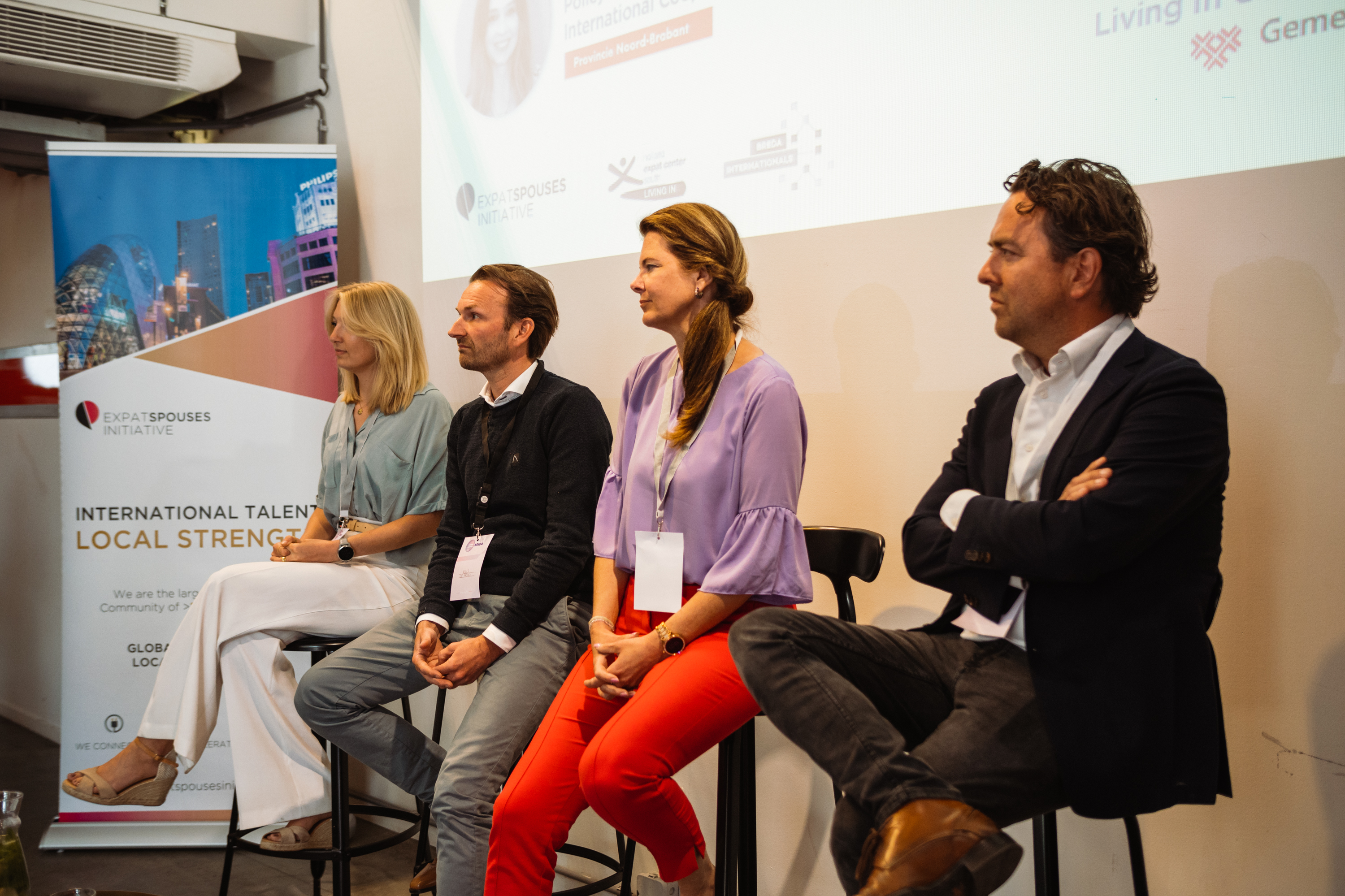
Panel Discussion Two
The Big Picture: Internationalisation and Integration
International professionals can be beneficial to regional companies but their inclusion in the local labour market and society has many different layers that must be considered. This is especially true since internationalisation and integration are not mature topics in Breda. The panel debated the wider approach for Breda can become more international and the importance of collaboration. The panellists were Carmen Rasmussen; Thijs Taminiau, Team Leader of Foreign Investments at Brabantse Ontwikkelings Maatschappij (BOM); Kris De Prins, Manager Director of Holland Expat Center South and; Nadine Gooijers, Strategic Advisor & Program Manager for Gemeente Breda. The discussion was moderated by Alina Totti, Policy Advisor of International Cooperation for the Province of North Brabant.
First Nadine outlined the strategic outlook from Breda’s governmental perspective. After years of declining investments and tourism, the regional government created a strategic plan to revamp the image and economy of the city. Nadine said, “Knowing who are as a city is not enough, we also want to know what our goals for the future are.” The three words appointed to reimagine the future of Breda were green, welcoming, and limitless. Green of course refers to sustainability, especially the transition to green energy. Welcoming because Breda is a city that is an inclusive place for everyone and limitless references an open, boundless opportunities the city possess and its mindset.
If internationals are needed to fulfil the strategic plans of the city, programs like Women for Women become invaluable. It takes skilled professionals from all backgrounds and helps transition them into the local labour market with the help of locals enthusiastic about helping others integrate. Carmen has seen how the program has helped the Breda Talents and is an international herself from Luxembourg:
“I have seen the Talents grow so much and in such a short time of three months. [The program] was quite a personal experience for me too because I also went through the same thing. I arrived [years ago] and I started a marketing job at Breda Business, but I didn’t speak Dutch. But they gave they gave me a chance and they gave me lessons... And that’s my story for other internationals, you can do it. But the companies need to see that there is potential. People are willing to learn, and I am one of the greatest examples.”
Of course, governmental support is not enough. Once the Talents are ready to enter the job market, they need to be welcomed by companies. Kris de Prins spoke about the work the Holland Expat Center does to help small and medium enterprises (SMEs) internationalise:
“In essence [the Holland Expat Center] helps internationals with settling. We help them with their formalities and all kinds of information that they need…But we do have outreach to companies as well, because we need both sides. If we have international talent present…we need to prep the SMEs as well to receive [them]. We created the International Talent Scan which can be filled out by companies and… they can see where they are when it comes to selecting, onboarding, and retaining international talent…If there are some blind spots, the scan will tell and give you advice on how to tackle that issue.”
Brabantse Ontwikkelings Maatschappij (BOM) also supports regional companies to internationalise and promotes the region to attract new companies and help them grow. Foreign companies have a significant impact in the region, according to Thijs, “1% of all companies in the Netherlands are foreign companies, but they account for 40% of the entire workforce and 30% of the economy.” When he speaks to companies “talent is at the top of their mind” because they are needed to help companies grow.
Yet there seems to be a disconnect. Everyone is looking for talent, but there remains resistance. Nadine and Kris both talked about a change in mindset that must occur if companies really want to take advantage of the extraordinary regional international talent available. Nadine said that candidates and employers need to “meet each other midway.” Employers need to “reach out maybe first English to get to know each.”
Kris added:
“Parties on all levels, provincial, national and local need to have a mindset that international people do matter. But let’s not wait to get that commitment from employers to make that shift to understand that the commitment is bigger than the first hire; it extends to the family, it extends to the spouse. Let’s work together to find the employers that want to collaborate with us to make change. And that [their] commitment [should also be] financial.”
Thijs agreed, “It’s important to work together as a sector. Because you cannot solve this problem anymore as a company alone. I think [companies] are looking for initiatives like this one to support this [goal].”
Carmen also agreed:
“Breda is working on becoming an international hotspot for applied technology and creativity. But to become this international hotspot for technology and creativity, we need the talents because they bring diversity…They bring different ideas. They can innovate your company and make your company grow.… but we need companies also to be open minded and hire [international] talents.”
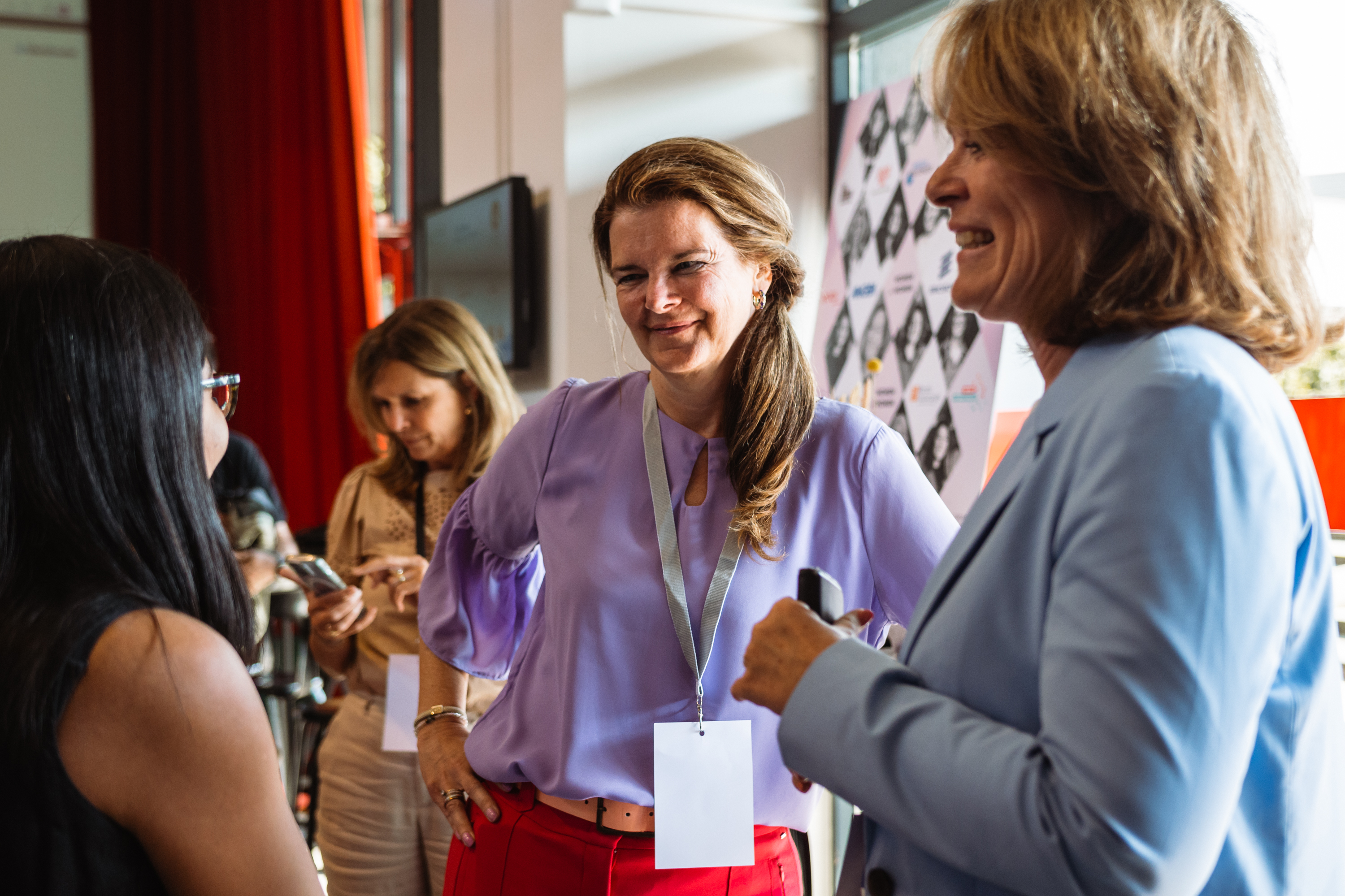
Grow and Innovate with International Talent
Together is the word that best sums up the Women for Women Breda Closing Finale. Local and national governments, non-profits and companies must work together to solve the talent shortage and create the Breda of the future. Talents and companies need to be flexible start conversing to find commonality. We, the Expat Spouses Initiative, Breda Internationals and Holland Expat Center South, have started the conversation already that will drive change in Breda. But it is up to all those present to take it further within their own networks and businesses. Are you ready?
Companies: If you are a local organization looking for international talent or if you want to learn more about the Expat Spouses Initiative, please contact us. We also have a diversity, equity, and inclusion initiative called Including You for early-adopters, either as a company or individual, to join.
Organisations: If you are a local organization passionate about helping internationals integrate or would like to brainstorm ways to collaborate with the Expat Spouses Initiative, please contact us via our webform.
Talents: To stay informed about our programs and workshops, we invite you to follow the Expat Spouses Initiative and Breda Internationals on LinkedIn. You can also join the ESI community by completing the profile form. Your profile will help us connect you to possible networking and job opportunities as well as information about upcoming ESI events and programs.
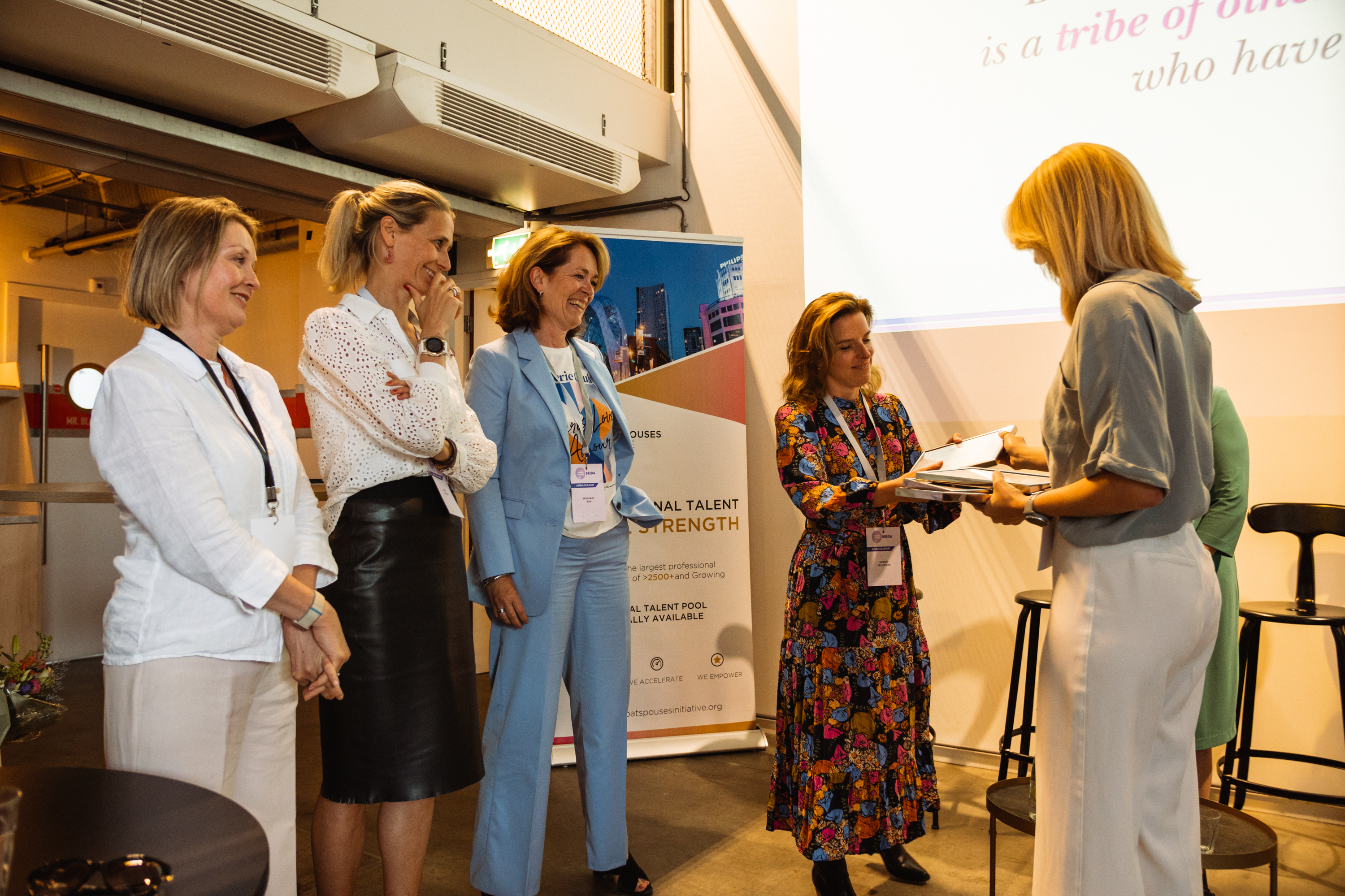
Thank you, Ambassadors
Women for Women Breda would not be possible without our Ambassadors. Thank you very much to Muriël Van Beurden (All Human); Lisette Jacobs (Lamb Weston); Femmy de Rijk (Amgen); Jacqueline Verschoor (Chassé Theater); Marije Walker (Louwman & Parqui); Monique Bax (Gemeente Breda); Nienke Fabries (Avans); Sabine Reijnders (Ericsson); Lucette Roovers-Martens (Breda University of Applied Sciences) and; Hanneke Veldhuis (Libréon) for your enthusiasm and dedication.
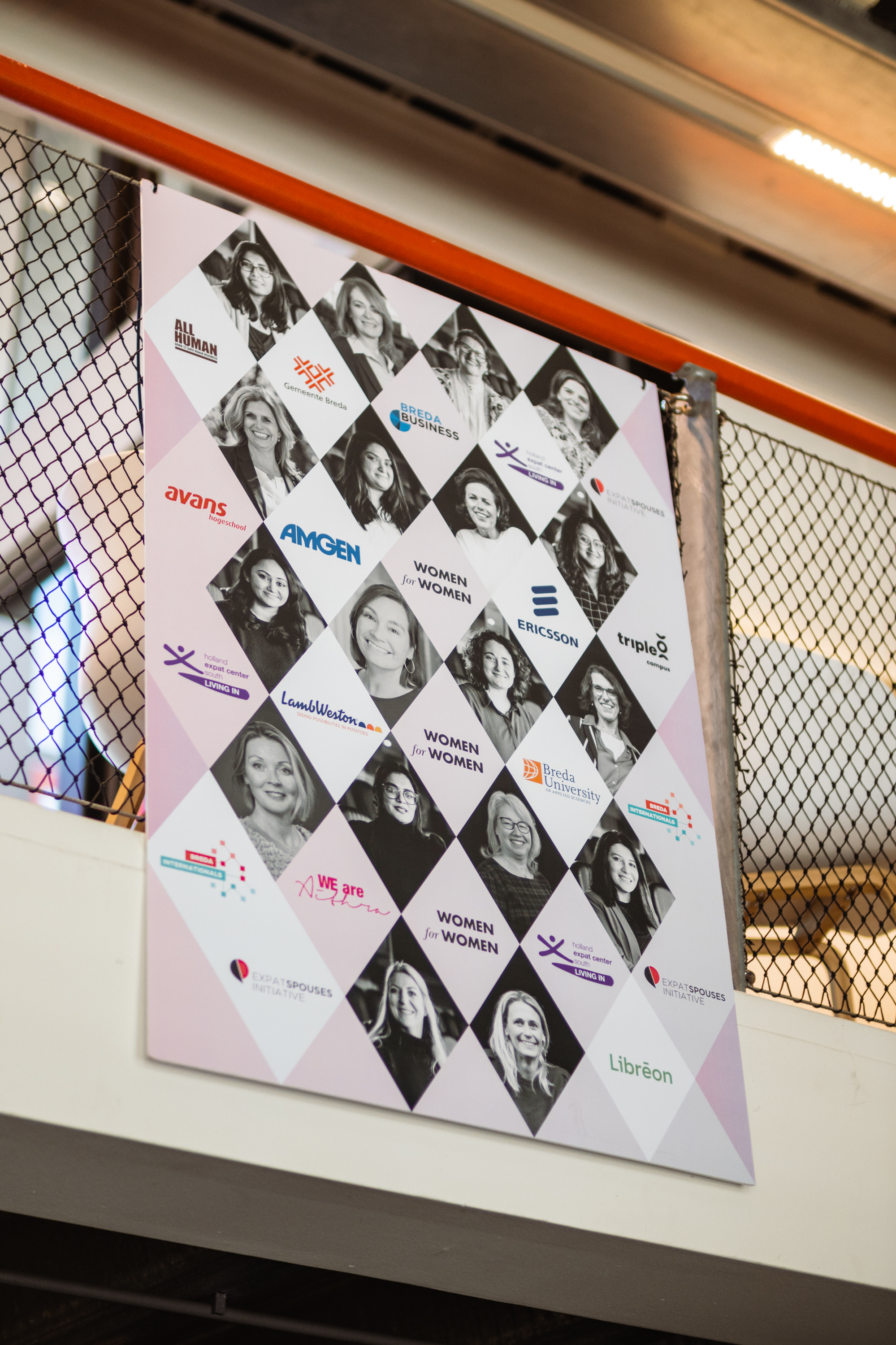
In collaboration with

